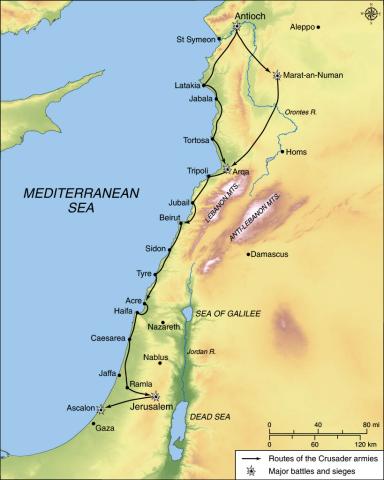The March to Jerusalem
[10.34.6] Exeuntēs autem dē optimā valle, pervēnimus ad quoddam castrum quod dīcitur Archae, in diē lūnae, scīlicet secundā fēriā mediante Februāriō; circā quod tentōria tetendimus. Quod castrum plēnum erat innumerābilī gente pāgānōrum, vidēlicet Turcōrum, Saracēnōrum, Arabum, Pūblicānōrum, et mīrābiliter mūnierant castrum illud, et dēfendēbant sē fortiter. Tunc, exeuntēs, quātuordecim ex nostrīs mīlitibus iērunt contrā Tripolim urbem, quae erat secus nōs. Istī quātuordecim invēnērunt circā sexāgintā Turcōs, et aliōs quōsdam; quī habēbant ante sē collēctōs hominēs et animālia plūs quam mīlle quīngenta. Quī, signō crucis mūnītī, invāsērunt eōs, et Deō iuvante mīrābiliter superāvērunt illōs, et occīdērunt sex ex illīs, apprehendēruntque sex equōs.
notes
(February 1099) The crusaders besiege the town of Archae (modern Arqa). Fourteen knights (apparently including our author) march to Tripoli where they engage about sixty Turks.
Archae: modern Arqa, on the northern coast of Lebanon.
in diē lūnae, scīlicet secundā fēriā mediante Februāriō: “on Monday, in the second week of February" (February 14, 1099).
Pūblicānōrum: Paulicians, see 1.4.4.
quātuordecim ex nostrīs mīlitibus: This incident is very small scale; it is tempting to think that it is included because our author took part.
quae erat secus nōs: “which was close to us.”
mīlle quīngenta: one thousand five hundred.
Quī, signō crucis mūnītī: the antecedent is istī quātuordecim, i.e., the fourteen Franks.
vocabulary
mediō (1): to halve, divide in the middle
tendō tendere tetendī tentum (tensum): to stretch out
secus: alongside, next to (prep. + acc.)

